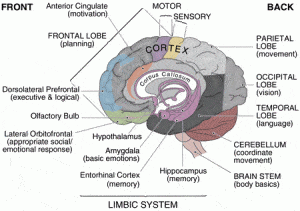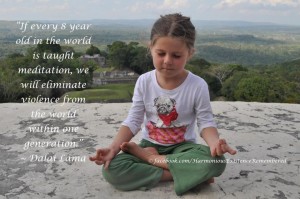Are you as smart as an 8 Year old?
Unexpected Surprises
I love brain science. It fascinates me and I appreciate how much it helps us to understand why we do the things we do – both the things that are troublesome and the things that excite our imaginations. We now know that we can change and grow our brains and therefore change what we do and how we feel.
 One evening, my daughter, Kristi, was sharing about the benefits of meditation on the brain. She is currently enrolled in a stress reduction course that is teaching her mindfulness practices. My 8 year old grandson, Josh, who was sitting nearby, piped up and asked us, “Are you talking about the amygdala?” We were dumbfounded by his comment!
One evening, my daughter, Kristi, was sharing about the benefits of meditation on the brain. She is currently enrolled in a stress reduction course that is teaching her mindfulness practices. My 8 year old grandson, Josh, who was sitting nearby, piped up and asked us, “Are you talking about the amygdala?” We were dumbfounded by his comment!
Our Brains Explain Our Behaviour
 While we were reeling from the awareness that he knew and could pronounce such a scientific term, he went on to explain what he’s learning in his grade 3 class. “My teacher told us that when we are in our amygdala, we do not make good decisions and it’s when I am goofing around with my friends. When I focus attention to my school work and get it done on time, then I’m in my pre-frontal cortex. We also make better decisions in our prefrontal cortex. Our hippocampus is the part we use to remember our math and other things we are learning.” He went on to explain how she uses “a chime” both first thing in the morning and after lunch to “get us into our prefrontal cortex.” The kids are asked to sit cross legged and close their eyes and listen to the sound of the chime. This helps them to calm the brain so that they can approach their tasks not feeling overwhelmed by the stimulation in the room. Kristi was both impressed and humbled, realizing that her son appeared to have a better handle on how his brain worked than she did.
While we were reeling from the awareness that he knew and could pronounce such a scientific term, he went on to explain what he’s learning in his grade 3 class. “My teacher told us that when we are in our amygdala, we do not make good decisions and it’s when I am goofing around with my friends. When I focus attention to my school work and get it done on time, then I’m in my pre-frontal cortex. We also make better decisions in our prefrontal cortex. Our hippocampus is the part we use to remember our math and other things we are learning.” He went on to explain how she uses “a chime” both first thing in the morning and after lunch to “get us into our prefrontal cortex.” The kids are asked to sit cross legged and close their eyes and listen to the sound of the chime. This helps them to calm the brain so that they can approach their tasks not feeling overwhelmed by the stimulation in the room. Kristi was both impressed and humbled, realizing that her son appeared to have a better handle on how his brain worked than she did.
Soothing Distress
If you have children then you know how emotionally volatile life can be for them. Children’s emotional states change in an instant as they get easily triggered and emotionally overwhelmed by life’s events. When children are left to fend for themselves during these times they cannot calm down on their own. In my family, we could have expected to hear “stop crying” or told “don’t you dare speak to me that way”. These responses are not helpful in soothing distress and they also trigger fear. Fear is stored in the amygdala. When children don’t have the emotional support they need to off load their distress along with healthy limits to help them feel safe, they develop coping mechanisms which lead to either acting out or shutting down.
Brain science teaches us what highjacks our peace & serenity and how to self-regulate in times of trouble. Teaching children basic mindfulness meditation techniques excites me! Meditation changes the brain in many positive ways. It builds up the areas that are associated with positive feelings – like happiness and hope for a brighter future. At the same time, it shrinks the parts of our brain that is associated with worry and regret. It teaches us to concentrate better, to slow down our impulses and to be calmer and more confident in life.
In fact, click the link below to watch this short video to see why meditation will soon be an important daily activity.
It seems that it is becoming more common for school curriculums to include time for teaching mindfulness to children. If this seems important to you, then take time to find out if your child’s school is doing it and if not, are they open to exploring the possibility.
Many adults understand how early emotional trauma or neglect can have long term effects. Adults bring these early copying styles (fighting, fleeing or resentfully complying) into their marriages or significant relationships – thereby unknowingly reenacting the emotional trauma with their partners. Learning techniques for calming yourself is one tool in becoming more emotionally connected to yourself and others in order to stop this painful replaying of the past. As a regular meditator I can’t say enough about the benefits I receive which allows me to run a busy practice, travel a lot and spend time with family and friends.
If you thought the information in this video made sense, and you are an adult who has difficulty self-regulating your emotions, ask yourself if you can begin some type of mindfulness practice. Start to pay attention to what triggers you to lose your temper, feel anxious or even disconnected from others. Go to a local bookstore or shop online for a cd or reading material that resonates with you and helps you learn to calm your amygdala. Let us know what you find that is helpful so we can share it with others.
Wishing you all the best on your journey to ever more emotional health.





Great article Sue! Love your logo and your colors which are similar to mine! Great taste.